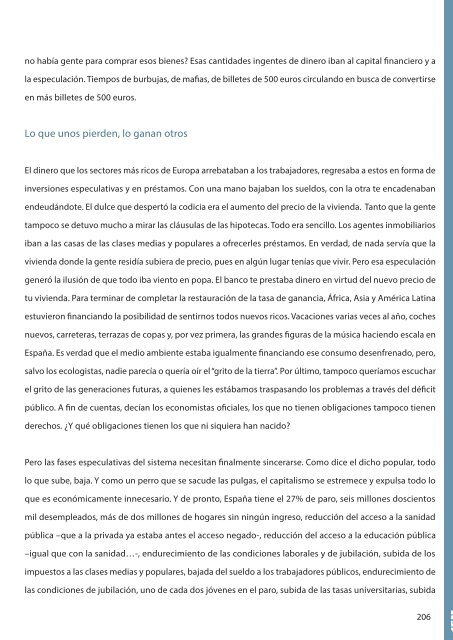cartas a @ s europe @ s cartas al europe letterstotheeuropeans
cartas a @ s europe @ s cartas al europe letterstotheeuropeans
cartas a @ s europe @ s cartas al europe letterstotheeuropeans
Create successful ePaper yourself
Turn your PDF publications into a flip-book with our unique Google optimized e-Paper software.
no había gente para comprar esos bienes? Esas cantidades ingentes de dinero iban <strong>al</strong> capit<strong>al</strong> financiero y a<br />
la especulación. Tiempos de burbujas, de mafias, de billetes de 500 euros circulando en busca de convertirse<br />
en más billetes de 500 euros.<br />
Lo que unos pierden, lo ganan otros<br />
El dinero que los sectores más ricos de Europa arrebataban a los trabajadores, regresaba a estos en forma de<br />
inversiones especulativas y en préstamos. Con una mano bajaban los sueldos, con la otra te encadenaban<br />
endeudándote. El dulce que despertó la codicia era el aumento del precio de la vivienda. Tanto que la gente<br />
tampoco se detuvo mucho a mirar las cláusulas de las hipotecas. Todo era sencillo. Los agentes inmobiliarios<br />
iban a las casas de las clases medias y populares a ofrecerles préstamos. En verdad, de nada servía que la<br />
vivienda donde la gente residía subiera de precio, pues en <strong>al</strong>gún lugar tenías que vivir. Pero esa especulación<br />
generó la ilusión de que todo iba viento en popa. El banco te prestaba dinero en virtud del nuevo precio de<br />
tu vivienda. Para terminar de completar la restauración de la tasa de ganancia, África, Asia y América Latina<br />
estuvieron financiando la posibilidad de sentirnos todos nuevos ricos. Vacaciones varias veces <strong>al</strong> año, coches<br />
nuevos, carreteras, terrazas de copas y, por vez primera, las grandes figuras de la música haciendo esc<strong>al</strong>a en<br />
España. Es verdad que el medio ambiente estaba igu<strong>al</strong>mente financiando ese consumo desenfrenado, pero,<br />
s<strong>al</strong>vo los ecologistas, nadie parecía o quería oír el “grito de la tierra”. Por último, tampoco queríamos escuchar<br />
el grito de las generaciones futuras, a quienes les estábamos traspasando los problemas a través del déficit<br />
público. A fin de cuentas, decían los economistas ofici<strong>al</strong>es, los que no tienen obligaciones tampoco tienen<br />
derechos. ¿Y qué obligaciones tienen los que ni siquiera han nacido?<br />
Pero las fases especulativas del sistema necesitan fin<strong>al</strong>mente sincerarse. Como dice el dicho popular, todo<br />
lo que sube, baja. Y como un perro que se sacude las pulgas, el capit<strong>al</strong>ismo se estremece y expulsa todo lo<br />
que es económicamente innecesario. Y de pronto, España tiene el 27% de paro, seis millones doscientos<br />
mil desempleados, más de dos millones de hogares sin ningún ingreso, reducción del acceso a la sanidad<br />
pública –que a la privada ya estaba antes el acceso negado-, reducción del acceso a la educación pública<br />
–igu<strong>al</strong> que con la sanidad…-, endurecimiento de las condiciones labor<strong>al</strong>es y de jubilación, subida de los<br />
impuestos a las clases medias y populares, bajada del sueldo a los trabajadores públicos, endurecimiento de<br />
las condiciones de jubilación, uno de cada dos jóvenes en el paro, subida de las tasas universitarias, subida<br />
15M<br />
financi<strong>al</strong> capit<strong>al</strong> and speculation. Those were the times of investment bubbles, of mafias, of 500 euro circu-<br />
lating in search of becoming more 500 euro.<br />
What some lose, others gain<br />
The money that the we<strong>al</strong>thiest sectors in Europe snatched from workers, returned to the former in the form<br />
of speculative investments and loans. With one hand they lowered wages, with the other hand they chained<br />
you to indebtedness. The candy that woke up greed was the housing prices. So much that few people spent<br />
time looking at the mortgage clauses. Everything was simple and straightforward. The re<strong>al</strong> estate agents<br />
went to middle and lower class homes offering loans. In truth, it didn’t matter that the price of the house in<br />
which we lived might go up, since we would still have to live somewhere. But that speculation generated<br />
the illusion that everything was going well and getting better. The bank would loan you money in respect<br />
to the new price of your house. To make the restoration of the development of greed complete, Africa, Asia<br />
and Latin America were financing the possibility for us <strong>al</strong>l to feel nouveaux riches. Going on holidays sever<strong>al</strong><br />
times a year, new cars, roads, pub terraces and, for the first time, the biggest musicians stopping by to perform<br />
in Spain. Truth be told, the environment was <strong>al</strong>so financing this shopping spree, but, except for ecologists,<br />
no one seemed to be or wanted to be listening to the “scream of the earth”. Lastly, we <strong>al</strong>so did not want to<br />
hear the cry of future generations, to whom we were transferring problems through public deficit. After <strong>al</strong>l,<br />
said the offici<strong>al</strong> economists, those without obligations should not have rights. And what obligations have<br />
those that are not even born?<br />
However the system’s speculative phases need fin<strong>al</strong>ly to confide. As the popular saying goes, everything<br />
that goes up, must come down. And like a dog trying to shake off its fleas, capit<strong>al</strong>ism trembles and expels<br />
everything it deems economic<strong>al</strong>ly unnecessary. And thus, Spain has an unemployment rate of 27%, six<br />
million and two hundred thousand people out of a job, more than two million households with no income,<br />
reduced access to public he<strong>al</strong>th - private he<strong>al</strong>th had <strong>al</strong>ready denied access - reduced access to public educa-<br />
tion - same as in the he<strong>al</strong>th sector ... - lower working conditions and pensions, higher taxes for lower and<br />
middle classes, lower s<strong>al</strong>aries for civil service workeres, one out of two youngsters is unemployed, rising<br />
206 207


